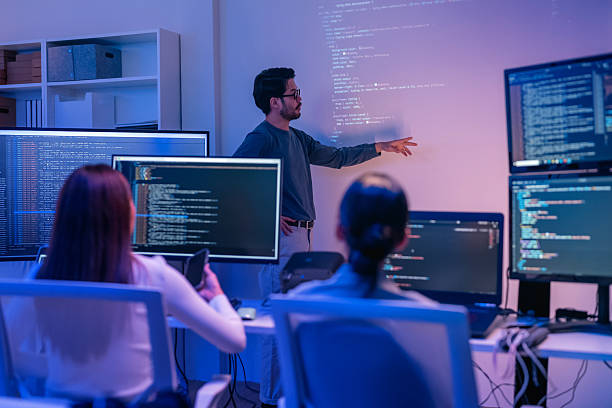Hey there, future digital superstar! Feeling a little left out when everyone talks about “the cloud,” “apps,” or “digital literacy”? Or maybe you just got your first computer or smartphone and are wondering where to even begin? Well, you’ve landed in the perfect spot! In 2025, being good with computers is a must. It helps you get jobs, stay in touch with family, learn new things, and manage your daily life.
Good news! You don’t need to go back to school in person or feel overwhelmed. The internet offers amazing online computer courses for beginners, made for you. These courses are super flexible, letting you learn at your own speed, right from your home, a local library, or even your favorite coffee shop.
In this super friendly guide, we’re going to walk you through everything you need to know about starting your computer journey online. Let’s talk about why these skills matter in 2025. We’ll explore the available courses and how to choose the right one for your digital journey. Ready? Let’s dive in!
Why Learning Computer Skills is a Game-Changer in 2025
You might be thinking, “Do I really need to learn computer skills?” And the answer, my friend, is a big, resounding YES! In 2025, computers and digital tools are everywhere, and knowing how to use them can open up a world of possibilities.
1. Unlock New Job Opportunities (and Keep Your Current One!)
It’s no secret: most jobs today require some level of computer know-how. Most workplaces depend on computers for many tasks. They send emails, write reports, manage schedules, and enter data. Taking beginner computer courses online can improve your resume. It shows employers you are ready for today’s digital world. It can help you land that first job, get a promotion, or even switch to a new career that excites you! Even if you’re already working, updating your skills keeps you valuable and adaptable.
2. Stay Connected with Family and Friends
Imagine video calling your grandkids, sharing photos with family everywhere, or chatting with friends. Computers and the internet make this possible! Learning how to use email, social media, and video call apps means you’re always just a click away from your loved ones, no matter where they are. It’s a fantastic way to banish loneliness and feel more connected.
3. Learn Anything, Anytime, Anywhere!
The internet is like the biggest library and classroom in the world, combined! Want to learn a new language? Cook a new recipe? Fix something around the house? Take a specialized course? It’s all there. Beginner online computer literacy courses help you explore a world of information and learning from home.
4. Manage Your Life with Ease
Many daily tasks are now done online. This includes banking, paying bills, booking appointments, and grocery shopping. Learning basic computer skills can make these chores quicker, easier, and often more secure. No more waiting in long lines or missing important deadlines!
5. Protect Yourself Online: Be Cyber Smart!
With more of our lives online, it’s super important to stay safe. Good basic computer will teach you about online security and privacy. You’ll discover how to recognize tricky scams, such as phishing emails. You’ll also learn to create strong passwords and safeguard your personal information. Think of it as learning the “rules of the road” for the internet – keeping you safe on your digital journey.
What You’ll Learn in a Beginner Computer Course (and Why It Matters!)
So, what exactly do these courses teach? If you’re starting from scratch, you’ll be amazed at how quickly you pick up essential skills. Here are the core things most computer basics courses for digital literacy will cover in 2025:
The Absolute Basics: Getting Comfortable with Your Computer
This is where you’ll start your journey. No fancy jargon, just simple, clear steps.
-
Understanding Your Computer Parts: What’s a keyboard? A mouse? A screen? What’s inside that box (the “tower” or “laptop”)? You’ll get to know all the pieces and what they do.
-
Turning It On and Off (the Right Way!): It seems easy, but knowing how to start and shut down your computer correctly helps it run well and avoids issues.
-
Navigating the Desktop: This is your computer’s “home screen.” You’ll learn how to find icons, open programs, and understand the different parts of the screen.
-
Using a Mouse and Keyboard: These are your main tools! You’ll practice clicking, dragging, typing, and using important keyboard shortcuts (like copy and paste – a real time-saver!).
-
Connecting to the Internet: How do you get online? You’ll learn about Wi-Fi, internet cables, and how to make sure you’re connected.
Mastering Essential Software: Your Digital Toolbox
Once you’re comfortable with the basics, you’ll dive into the programs you’ll use every day.
-
Word Processing (Like Microsoft Word or Google Docs): This is for writing! You’ll learn how to type letters, reports, resumes, or even a story. You’ll practice making words bold, changing fonts, and saving your work.
-
Spreadsheets (like Microsoft Excel or Google Sheets) help with numbers and organizing info. Imagine making a budget, tracking expenses, or creating simple lists. You’ll learn how to enter data, do basic math, and make sense of numbers.
-
Presentations (Like Microsoft PowerPoint or Google Slides): Want to share ideas with pictures and text? This is the tool! You’ll learn how to create slides, add images, and make your presentations look good.
-
Email (Like Gmail or Outlook): Sending and receiving messages is a huge part of being online. You’ll learn how to create an email account, send messages, attach files, and manage your inbox. Plus, you’ll learn important “email etiquette” – how to write politely and professionally.
-
Web Browse and Online Research: How do you find information on the internet? You’ll learn to use web browsers such as Chrome or Firefox. You’ll also explore search engines like Google. This will help you find reliable information quickly and safely.
Staying Safe and Savvy: Digital Citizenship in 2025
Beyond just using the tools, good courses will teach you how to be smart and safe online.
-
File Management: Keeping Things Organized! Ever lost an important document on your computer? You’ll learn how to create folders, save files, and keep your digital life neat and tidy so you can always find what you need. This also includes understanding cloud storage (like Google Drive or Dropbox) for backing up your important stuff.
-
Online Security and Privacy: This is so important! You’ll learn to create strong passwords. You’ll also recognize phishing scams, which are fake emails that try to trick you. Plus, you’ll understand privacy settings on websites and apps. It’s about protecting your information and staying safe from online threats.
-
Basic Troubleshooting: Computers can be a bit tricky sometimes. You’ll learn simple ways to fix common problems, like when your internet isn’t working or a program freezes. Knowing how to restart properly or check basic settings can save you a lot of headaches!
-
Online Communication & Collaboration: You’ll go beyond email. Explore video calls like Zoom and Google Meet. Learn to work on shared documents in real-time with others. This is super useful for work, school, or even planning events with friends.
Finding the Best Online Computer Courses for You in 2025
Okay, you’re excited to start! But with so many options, how do you pick the right one? Here’s a step-by-step guide to finding the best online computer courses for beginners:
Step 1: Figure Out Your Goal
Why do you want to learn computer skills?
-
For a new job or career? Look for courses that offer “digital literacy certificates” or focus on “basic computer skills for employment.”
-
To stay connected with family? Focus on courses that emphasize email, social media, and video calls.
-
To manage personal tasks? Look for modules on online banking, shopping, and general internet use.
-
Just for general learning? Any reputable basic computer course will do!
Knowing your goal helps you narrow down your choices.
Step 2: Look for Reputable Platforms and Organizations
In 2025, there are many excellent places to find entry-level computer skills online learning. Some top choices include:
-
Coursera, edX, and Udemy are major online learning platforms. They team up with universities and companies like Google, Microsoft, and IBM to provide courses. They often have beginner-friendly “specializations” or “professional certificates.”
-
Google’s Grow with Google and Google Digital Garage provide free and paid courses. They cover many digital skills, including computer basics. These courses are very practical.
-
Microsoft Learn / Microsoft Digital Literacy: Microsoft offers resources to learn about Windows and Microsoft Office. You can explore tools like Word, Excel, PowerPoint, and Outlook.
-
GCFGlobal (Goodwill Community Foundation) is a great free resource. It has helped people learn technology for years. Their tutorials are easy to follow.
-
AARP, Senior Planet, and GetSetUp offer courses for seniors. These programs focus on ease of use and provide community support.
-
Local Libraries and Community Centers: Many local places offer free or low-cost computer classes. They may also give access to online learning platforms, even if they aren’t always online.
Step 3: Check the Course Content and Reviews
Once you find a few interesting courses:
-
Read the Syllabus/Curriculum: Does it cover the topics you want to learn? Is it really for “beginners” or does it expect you to know a few things already?
-
Look at Reviews and Ratings: What do other students say? Are the instructors clear and helpful? Is the pace good for beginners?
-
Check for Interactive Elements: Do they have videos, quizzes, practice exercises? Hands-on learning is best for computer skills!
-
Does it Offer a Certificate? If getting a certificate for your resume is important, make sure the course provides one upon completion. Many free online computer courses for beginners with certificate options exist.
Step 4: Consider the Cost (Free vs. Paid)
-
Free Courses: Many excellent free options exist (like GCFGlobal, some Google courses, and audit tracks on Coursera/edX). These are great for getting started without spending money.
Step 5: Think About Your Learning Style
-
Video Learners: If you like watching and following along, look for courses with lots of video lessons.
-
Reading Learners: If you like to read, choose courses that have clear written instructions and tutorials.
-
Hands-On Learners: Look for courses with lots of practice exercises and real-world projects.
Tips for Success on Your Online Computer Course Journey
Starting something new can feel a bit scary, but you’ve got this! Here are some friendly tips to help you succeed in your online computer course for beginners:
-
Start Small: Don’t try to learn everything at once. Focus on one topic at a time (like using the mouse) until you feel comfortable.
-
Practice, Practice, Practice: The more you use your computer, the more natural it will feel. Don’t just watch – do! Open programs, type, save, and explore.
-
Be Patient with Yourself: Everyone makes mistakes. It’s part of learning! If something doesn’t work, take a deep breath, try again, or look up a quick tutorial.
-
Set Aside Regular Time: Even 15-30 minutes a few times a week can make a big difference. Make it a habit!
-
Ask for Help: If you get stuck, don’t be afraid to ask. Many online courses have discussion forums, or you can ask a friend or family member for a quick hand. Remember, there are no “silly” questions when you’re learning!
-
Take Notes: Write down steps, shortcuts, or anything important you learn. This helps you remember and gives you something to refer back to.
-
Celebrate Your Wins! Every time you learn something new – sending an email, saving a document, or finding something online – give yourself a pat on the back! You’re building amazing new skills.
The Future is Digital, and You’re Ready for It!
In 2025, knowing how to use computers is truly a superpower. It’s a skill that will empower you in your career, connect you with loved ones, and open up endless opportunities for learning and enjoyment.
Don’t let the digital world intimidate you. There are many great online computer courses for beginners. Now, starting your journey is easier than ever. Pick a course, set your goals, and get ready to unlock a whole new world! Your digital adventure starts now.
FAQs About Online Computer Courses for Beginners (2025)
Here are some common questions people ask about learning computer skills online:
Q1: I’m really old-fashioned and have never used a computer. Can I really learn online?
A1: Absolutely! Many online computer literacy courses for seniors or beginners are designed with patience. They offer clear and simple steps. Platforms like GCFGlobal, Senior Planet, and GetSetUp are great for beginners. They focus on practical tasks to help build confidence in everyday skills. You learn at your own pace, which is perfect!
Q2: What’s the most important computer skill for a beginner to learn first in 2025?
A2: Many skills matter, but understanding digital file management and online security is key. Digital file management means saving and organizing your documents, photos, and files. Online security involves creating strong passwords and spotting scams. These protect your information and help you keep your digital life organized from the very beginning.
Q3: Are there any free computer courses for beginners that give a certificate?
A3: Yes! Many platforms offer free online computer courses for beginners with certificates. For example, GCFGlobal provides certificates for many of its tutorials. Some courses on Coursera or edX might allow you to “audit” the course for free (access all materials) and then offer a paid option for the certificate. Google offers free learning pathways and certificates via Skillshop or Google Digital Garage.
Q4: How long does it take to learn basic computer skills online?
A4: It really depends on you! Some very basic “computer literacy” courses can be completed in just a few hours or a few days. Basic computer skills courses cover operating systems, word processing, spreadsheets, and internet safety. They can last a few weeks or even months. This depends on how many hours you spend each week. The beauty of online learning is you can go at your own pace!
Q5: Do I need a brand-new computer to take these courses?
A5: Not at all! Most online computer courses for beginners are designed to work on almost any modern computer or even a tablet. As long as your device can connect to the internet and run basic web browsers, you should be good to go. You don’t need the latest and greatest technology to learn the fundamentals.
Q6: Will these online courses help me get a job?
A6: Yes! Many employers in 2025 look for candidates with “digital literacy” or “computer proficiency.” Taking online computer courses shows your initiative and gives you the basic skills for many entry-level jobs. Listing skills like “Microsoft Word,” “Excel,” or “Email Management” on your resume can boost your chances.


